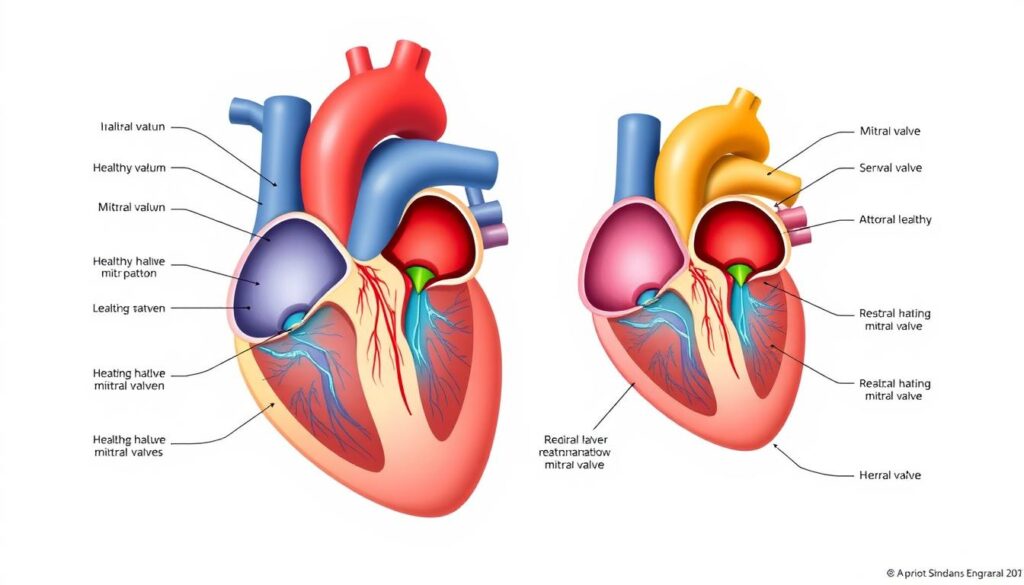Your heart is a complex machine. Understanding heart valve disease is vital for good cardiac health. Mitral valve regurgitation occurs when blood leaks backward through the mitral valve1.
This condition can affect your overall heart health and life quality2. When the mitral valve doesn’t close properly, blood flows in the wrong direction. This can lead to serious heart problems.
Mitral valve regurgitation can be mild or severe. Some cases need immediate medical care2. Knowing about this condition helps you take care of your heart.
Early detection and proper management are key. These steps can prevent serious complications linked to mitral valve regurgitation1.
Key Takeaways
- Mitral valve regurgitation is a common heart valve disease
- The condition can range from mild to severe
- Early detection is crucial for effective management
- Lifestyle factors can impact the progression of the condition
- Multiple diagnostic tests are available for accurate assessment
Understanding Mitral Valve Regurgitation: Causes and Risk Factors
Your heart’s valve system keeps blood flowing properly. Mitral valve regurgitation happens when the mitral valve doesn’t close right. This lets blood flow backward into the heart chamber3.
The condition can develop quickly or slowly over time3. It’s crucial to understand its causes and risks.
Common Causes of Valve Leakage
Multiple factors can lead to mitral valve problems. The main causes include:
- Mitral valve prolapse
- Rheumatic fever
- Heart attacks
- Congenital heart defects
- Cardiomyopathy
Some unique risk factors exist. For example, past use of diet pills like Fen-Phen can increase your risk3.
Key Risk Factors to Consider
Knowing your personal risk is important. Over 2% of people worldwide have mitral regurgitation4. The risk goes up as you get older.
Key risk factors include:
| Risk Category | Specific Risks |
|---|---|
| Medical Conditions | Congestive heart failure, heart murmur, rheumatic heart disease |
| Historical Factors | Previous heart attacks, valve diseases |
| Age-Related Risks | Increased vulnerability with advancing age |
Awareness is your first line of defense. Regular check-ups can help spot mitral valve regurgitation early. This can prevent more serious problems3.
Identifying Signs and Managing Your Symptoms
Recognizing mitral valve regurgitation signs is vital for your heart health. Your body may send warning signals about your heart’s function. Common symptoms include:
- Persistent fatigue
- Shortness of breath
- Irregular heartbeat (arrhythmia)
- Swollen feet or ankles
- Heart palpitations
An echocardiogram is the main tool doctors use to check your heart. This painless test detects valve stenosis and measures mitral valve regurgitation severity5.
“Early detection can prevent serious heart complications” – Cardiac Health Experts
Your doctor may suggest different strategies based on your condition’s stage. Mild cases might need regular check-ups. Severe cases could require medication or heart surgery6.
Untreated heart rhythm problems can lead to serious issues. These may include:
- Atrial fibrillation
- Pulmonary hypertension
- Congestive heart failure
- Increased stroke risk
Talking to a heart specialist can help you understand your condition better. They can create the best treatment plan for you5.
Conclusion
Managing mitral valve regurgitation demands a proactive approach to heart care. Understanding the condition is crucial for your overall heart health. Over 2 million Americans are affected by mitral regurgitation7.
Your treatment options depend on the severity of your condition. Up to 70% of adults may have mild mitral regurgitation8. Not all cases need immediate action. Work closely with your cardiologist to find the best strategy.
Regular check-ups are vital, especially for moderate to severe cases of mitral valve issues. Heart health involves more than just medical treatments. Lifestyle changes can greatly impact your cardiac well-being.
Severe mitral regurgitation patients should watch for fatigue, shortness of breath, and weakness8. Modern treatments offer hope. Surgical options like valve repair or replacement8 show promising outcomes9.
Your active role is key. Stay informed and follow recommended treatments. Early detection and personalized care help maintain heart health and life quality9.
FAQ
What is mitral valve regurgitation?
What are the main causes of mitral valve regurgitation?
What symptoms should I watch for?
How is mitral valve regurgitation diagnosed?
What treatment options are available?
Who is at higher risk for mitral valve regurgitation?
Can mitral valve regurgitation be prevented?
Is mitral valve regurgitation a serious condition?
Source Links
- Mitral Valve Regurgitation: Symptoms & Causes | NewYork-Presbyterian – https://www.nyp.org/heart/heart-valves/mitral-valve-regurgitation
- Mitral Valve Regurgitation: Diagnosis & Treatment – https://www.massgeneralbrigham.org/en/patient-care/services-and-specialties/heart/conditions/mitral-valve-regurgitation/treatment
- Mitral valve regurgitation – https://www.mountsinai.org/health-library/diseases-conditions/mitral-valve-regurgitation
- Mitral Regurgitation – StatPearls – NCBI Bookshelf – https://www.ncbi.nlm.nih.gov/books/NBK553135/
- What Is Mitral Valve Regurgitation? – https://www.webmd.com/heart-disease/what-is-mitral-valve-regurgitation
- Mitral valve regurgitation – Diagnosis and treatment – https://www.mayoclinic.org/diseases-conditions/mitral-valve-regurgitation/diagnosis-treatment/drc-20350183
- Primary mitral valve regurgitation: Update and review – https://pmc.ncbi.nlm.nih.gov/articles/PMC6516795/
- Patient education: Mitral regurgitation (Beyond the Basics) – https://www.uptodate.com/contents/mitral-regurgitation-beyond-the-basics/print
- How to manage mitral valve regurgitation – https://www.escardio.org/Journals/E-Journal-of-Cardiology-Practice/Volume-6/How-to-manage-mitral-valve-regurgitation
